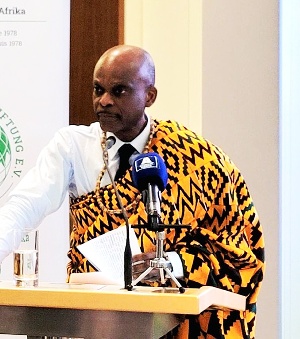- Home - News
- Elections 2024
- News Archive
- Crime & Punishment
- Politics
- Regional
- Editorial
- Health
- Ghanaians Abroad
- Tabloid
- Africa
- Religion
- Photo Archives
- Press Release
General News of Thursday, 17 April 2025
Source: www.ghanawebbers.com
Togo’s Foreign Minister On A Crusade To Tell Africa’s True History
Robert Dussey and the True History of Africa
An African proverb states, "Until lions have their own historians, the history of the hunt will always glorify the hunter." This reflects how African history has often been told. Africans have not documented their past adequately. Consequently, colonizers have shaped a narrative that misrepresents Africa. Togo’s foreign minister, Robert Dussey, aims to correct this.
Dussey highlights a significant fact: the ancient Mali Empire created a codified human rights law in the 13th century. This was over 500 years before France's “Declaration of the Rights and of the Citizen.” Unfortunately, Africa is rarely credited with this achievement. Historians refer to it as the Charter of Manden or Kurukan Fuga. This document outlined principles for social harmony and protection of life.
At the “London Conference: 125 Years Later,” Dussey spoke about Africa's historical contributions. He stated that Africans understood human rights long before colonial influences. He emphasized teaching children about the Charter of Manden proclaimed in 1236 during Sundiata Keita's enthronement.
The Manden Charter is one of the oldest constitutions globally. It was inscribed on UNESCO’s list in 2009 for its cultural significance. Although the Mali Empire no longer exists, its principles endure through generations.
The London conference is part of meetings leading up to December's 9th Pan-African Congress in Lome, Togo. Dussey said this Congress will address justice and equality for African people. Historical gatherings from Paris in 1919 to Accra in 1958 strengthened demands against injustices.
Dussey stressed that time cannot diminish their quest for reparations. He affirmed Togo's commitment to reconciliation and justice for past wrongs. The visionaries at previous congresses aimed to unite Africans against racism and oppression.
He noted that since 1900, there has been progress but challenges remain. The end of slavery does not mark the end of their struggle for justice.
The London conference remains crucial today due to ongoing issues surrounding reparations for Black people worldwide. Dussey called for sincere dialogue regarding historical crimes against Africans.
Pan-African activist Akyaaba Addai-Sebo spoke about decolonization efforts within Pan-Africanism. He argued that colonialism dehumanized indigenous cultures and knowledge systems.
Barryl Biekman from Africa’s diaspora commission highlighted ongoing Afrophobia despite anti-discrimination policies being ratified globally. He proposed declaring 2026 as a year of remembrance for racial justice.
Eric Philips from Guyana’s Reparation Committee emphasized accountability over guilt regarding historical injustices faced by Black people today.
Deputy Vice-Chancellor Laura Hammond honored influential Black figures like Walter Rodney at SOAS University. She discussed SOAS's commitment to equitable partnerships with African universities.
Hammond mentioned programs designed to support education across Africa, including collaborations with various countries like South Africa and Uganda.
These initiatives aim to provide quality education opportunities without financial barriers for students who cannot travel abroad easily.











